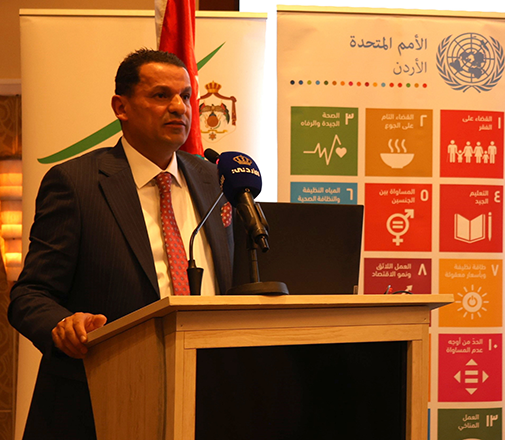You are here
HRD underlines King’s efforts on human rights advancement
By JT - May 27,2024 - Last updated at May 27,2024
AMMAN — Director of the Prime Ministry’s Human Rights Department (HRD) Khalil Abdallat on Sunday emphasised commitment of His Majesty King Abdullah to advance human rights in Jordan.
The Royal vision, rooted in the principles of Islam and authentic Arab values, is in line with international trends in this field.
In an interview with the Jordan News Agency, Petra, on the occasion of the Silver Jubilee and Independence Day, Abdallat stressed His Majesty’s belief in the fundamental rights of individuals to live in freedom and dignity, free from discrimination based on religion, gender, race or any other characteristic.
He stressed the importance of democracy and political participation as essential components in the promotion of human rights.
His Majesty’s vision emphasises the need to respect the rule of law, protect individual and collective rights and achieve social justice as the basis for the promotion of human rights. It also encourages dialogue and tolerance among different social groups in order to promote mutual understanding and respect, he said.
He noted that this royal vision has been translated into significant constitutional reforms led by His Majesty, which have strengthened the protection of human rights. These include broadening political participation, strengthening the independence of the judiciary, and establishing national human rights institutions such as the National Centre for Human Rights.
In addition, His Majesty’s directives have resulted in the enactment of numerous laws and regulations to promote human rights, including the Children’s Act and the Political Parties and Elections Act. Programmes and projects to promote a culture of human rights have been launched, as well as active participation in international human rights forums to enhance global cooperation.
Abdallat underlined His Majesty’s belief that political modernisation is crucial to strengthening public participation and the rule of law. He also emphasised the role of economic modernisation in creating employment opportunities and improving living standards, and the importance of developing the public sector for greater efficiency and effectiveness.
He linked modernisation to freedom and democracy, noting that it promotes political participation and accountability. Achieving social justice helps to reduce poverty and marginalisation and enhances people’s ability to enjoy their rights. Good governance ensures respect for the rule of law and the protection of individual and collective rights, he added.
Commenting on the human rights situation in Jordan, Abdallat said that significant progress has been made in recent years as a result of government efforts and reforms. The government has enacted national legislation, amended the constitution to bring it into line with global developments, and developed national laws to comply with international obligations, particularly the core human rights conventions it has ratified.
The State has also launched national initiatives and strategies, established institutions focused on human rights, and reinforced this culture through education and awareness-raising programmes.
Despite the challenges, the Jordanian government is committed to improving human rights through the Comprehensive National Plan for Human Rights 2016-2025, which supports national institutions such as the National Centre for Human Rights, the National Council for Family Affairs, the Supreme Council for the Rights of Persons with Disabilities, and the Jordanian National Committee for Women’s Affairs.
Abdallat highlighted the role of the Human Rights Unit in national consultations for the Universal Periodic Review of human rights, collecting opinions and suggestions from stakeholders, including NGOs and civil society institutions, and contributing to the preparation of national reports with various government agencies.
The Comprehensive National Plan for Human Rights serves as a roadmap for fulfilling Jordan’s international human rights obligations, setting goals for the government, outlining measures to achieve them, and identifying responsible bodies, timeframes, and mechanisms for evaluation and updating.
Looking to the future, Abdallat expressed the intention to evaluate all related efforts and to incorporate voluntary commitments and recommendations from international bodies and the Sustainable Development Goals into future planning.
He stressed the government’s commitment to strengthening partnerships with various stakeholders, including NGOs, civil society institutions, the private sector, international organisations and individuals, to promote human rights in Jordan.
Abdallat also underlined the crucial role of the media in promoting a culture of human rights, raising awareness and educating the public about fundamental rights such as life, freedom, equality and dignity. Media coverage of violations and victims’ stories helps stimulate efforts to address these issues, while providing platforms for dialogue and promoting tolerance and respect.
Abdallat reaffirmed Jordan’s commitment to continue improving human rights and strengthening cooperation with all relevant parties. He expressed confidence that the best practices and achievements will contribute significantly to achieving the desired goals and underlined the commitment to building a strong foundation for the protection of human rights and fundamental freedoms.
Related Articles
AMMAN — Director of the Prime Ministry’s Human Rights Department (HRD) Khalil Abdallat on Tuesday said the Kingdom is in the final pre
AMMAN — Royal directives continue to drive Jordan's efforts to enhance rights and integration for persons with disabilities, Director of the
AMMAN — Director of the Prime Ministry’s Human Rights Department Khalil Abdallat on Tuesday said that Jordan reaffirmed its leadership in di


















